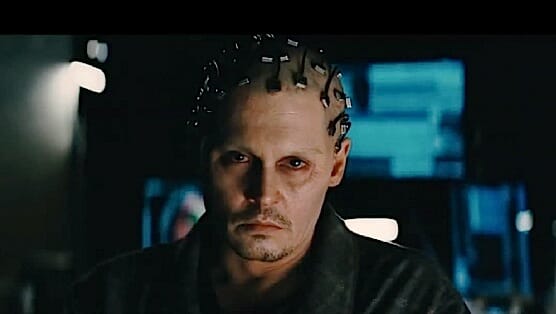Transcendence

It turns out that helping a Hollywood studio make a couple billion dollars opens some occupational doors. Ergo Wally Pfister, Christopher Nolan’s Oscar-winning cinematographer on Inception and the Batman films, jumps into the director’s chair for the first time with Transcendence, a techno-thriller that over the course of two hours systematically squanders an interesting concept, in deflating fashion. If science fiction can, intellectually and production-scope wise, either go big or go home, Transcendence is the latter version masquerading as the former: an over-plotted movie—glossy and expansive but about two inches deep—of contrasting wingnut philosophies and flat-line emotional affect.
Dr. Will Caster (Johnny Depp) is a hotshot scientific researcher and Wired magazine cover boy who strives to marry next-generation artificial intelligence with a machine that possesses self-awareness and expressivity. His partner in work and life, wife Evelyn Caster (Rebecca Hall), is a more socially minded activist, envisioning science as a tool to change the world. When in a massive coordinated strike Will is felled by a group of extremists who oppose unfettered technological advancement, both Evelyn and Will’s colleague and friend, Max Waters (Paul Bettany), upload his mind and memory into a computer to try to save him.
Their experimental gambit works, but the rebooted Will also has a rapacious quality he justifies by the end goals of societal betterment. As he and Evelyn set up in a dusty Southwestern shantytown and embark upon a sprawling campaign of engineered change, it puts them at odds with parties working to stop them, including Max, mentor Joseph Tagger (Morgan Freeman) and the obligatory FBI agent, Donald Buchanan (Cillian Murphy).
If it seems a bit of a clichéd criticism to charge that Transcendence is a movie more preoccupied with its visual prettiness than the intellectual rigors of its story, it nonetheless remains true. Pfister, working with cinematographer Jess Hall and a capable production design and digital effects team, delivers a film that dutifully replicates things one might want to see in a story like this: close-ups contrasting the glow of formula-filled whiteboards with idyllic nature; moments of nanotechnology razzle-dazzle; and, of course, a couple cool bursts of striking action, as with scenes of particles floating up from the ground to the sky.
To what end, though? One feels awkward advocating for the tinkering of multiple writers, but Jack Paglen’s script is a purely base-level, functional thing, in desperate need of a RAM upgrade. It treats important plot points like the development of “networked hybrids,” humans plugged into the Internet so that Will can manipulate their actions and even speak through them, as a total shrug—never depicting either a conversation with Evelyn about it or fallout specific to it. (She only blanches when Will tries to put the moves on her via a physical surrogate, as in Her.)
-

-

-

-

-

-

-

-

-

-

-

-

-

-

-

-

-

-

-

-

-

-

-

-

-

-

-

-

-

-

-

-

-

-

-

-

-

-

-

-








































